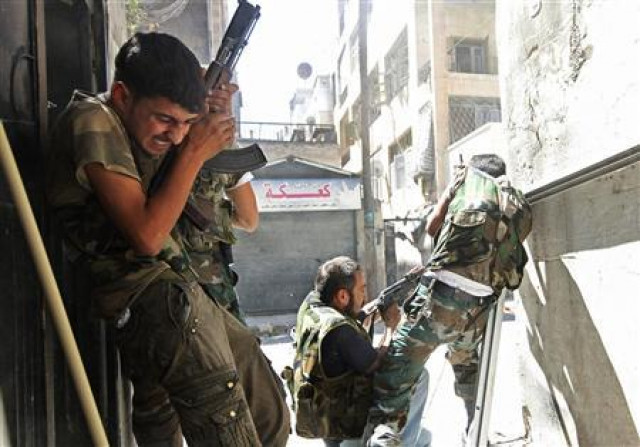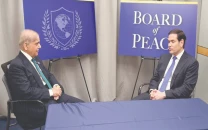Syrian army batters parts of Damascus, 47 killed
The Syrian army shelled southern Damascus on Wednesday and helicopters fired rockets and machine-guns.

The army has this week used tanks and helicopter gunships in an offensive around Damascus that coincided with the departure of UN military observers, their mission to stop the bloodshed and nudge Syria towards a peaceful transition a failure.
The United Nations estimates that more than 18,000 people have been killed in what has become a civil war after the state's violent response to peaceful street protests triggered an armed rebellion in the pivotal Arab country.
Anti-Assad activists said at least 47 people had been killed in Damascus in what they called the heaviest bombardment this month. "The whole of Damascus is shaking with the sound of shelling," said a woman in Kfar Souseh, one of several districts hit in the military offensive to root out rebel fighters.
The United Nations said some of the weapons being used by government forces appeared to have been supplied by Iran, in violation of a UN resolution that banned such exports.
UN Secretary-General Ban Ki-moon will raise the Syria crisis with Iran at a summit of non-aligned developing nations in Tehran next week, a UN spokesman said.
As the army continued to shell southern Damascus, activists said at least 22 people had been killed in Kfar Souseh and 25 in the nearby district of Nahr Eisha.
One of the dead was named as Mohammad Saeed al Odeh, a journalist employed at a state-run newspaper who was sympathetic to the anti-Assad revolt. Activists said he had been executed in Nahr Eisha.
"There are 22 tanks in Kfar Souseh now and behind each one there are at least 30 soldiers. They are raiding houses and executing men," an opposition activist in Kfar Souseh, who gave his name only as Bassam, told Reuters by Skype.
More than 250 people, including 171 civilians, were killed across Syria on Tuesday, mostly around Damascus, Aleppo and the southern city of Deraa, according to the Syrian Observatory for Human Rights, a British-based opposition monitoring group.
Activists in the southwestern Damascus suburb of Mouadamiya said Assad's forces had killed 86 people there since Monday, half of them by execution. It was not possible to verify that report.
There was no immediate government account of the latest fighting. But state television broadcast footage of weapons it said had been seized from rebels in Mouadamiya, one of the first districts to join the uprising.
The conflict, which pits a mainly Sunni Muslim opposition against a ruling system dominated by Assad's Alawite minority, threatens to destabilise neighbours including Lebanon, where Sunni-Alawite violence flared for a third day.
The death toll from the fighting in the northern Lebanese city of Tripoli rose to at least 10 with more than 100 wounded, medical sources said, in what residents said were some of the fiercest clashes there since Lebanon's 1975-90 civil war.
The Syria conflict has revived old tensions in Tripoli between pro-Assad Alawites in the hilltop district of Jebel Mohsen and their Sunni neighbours in Bab al-Tabbaneh below.
Aleppo battles
In Syria, Assad's forces have lost swathes of territory in recent months, but have fought back hard in Damascus and in Aleppo, the country's biggest city and commercial hub until it became a theatre for urban warfare.
Reuters journalists in Aleppo on Wednesday heard gunfire and shells exploding every minute.
Rebels trying to advance in Saif al-Dawla, a front-line Aleppo district, encountered mortar and rocket-propelled grenade fire. At one point, their escape route was cut off by gunfire as tank shells exploded nearby. Much of the area was destroyed.
State television said government forces were pursuing "the remnants of armed terrorist gangs."
Donatella Rovera, a senior crisis response adviser for Amnesty International, who recently returned from a 10-day visit to Aleppo, said the rights group in vestigated some 30 attacks in which scores of civilians not involved in hostilities, many of them children, were killed or injured in their homes, while queuing for bread and even in places where those displaced by the conflict were sheltering as a result of indiscriminate attacks against residential neighbourhoods.
"The use of imprecise weapons, such as unguided bombs, artillery shells and mortars by government forces has dramatically increased the danger for civilians", Roveras aid.
While the situation at the front line remained difficult, just 400 metres (400 yards) behind it, women and children were walking down the streets casually - some carrying groceries - and just 1 km back streets were bustling with normal life.
Children carried groceries from shops doing brisk business and couples held hands as smoke from the fighting rose into the sky behind them.
Away from the main cities, government forces fought rebels for control of a military base and airfield near the eastern town of Albu Kamal on the Iraqi border, according to a local Iraqi official and a Syrian rebel commander.
The rebel commander, known as Abu Khalid, said his forces now controlled Albu Kamal, straddling a supply route from Iraq where many Sunni tribes sympathise with their Syrian kin.
But rebels were on the back foot near the border with Turkey after Syrian soldiers backed by helicopters attacked a village to try to cut off a supply line, opposition sources said.
At least three people were killed and 10 wounded when army helicopters bombarded Qastoun, a village in Hama province, 24 kms (15 miles) east of the Turkish border, and rebels fought loyalist troops, the Hama Revolutionary Council said.
As Syria slips deeper into chaos, the United States and Israel have voiced concern that Assad might lose control of his chemical weapons arsenal or even be tempted to use it.
Russia, a Syrian ally since Soviet times, believes Syria has no intention of using its chemical weapons and is able to safeguard them, the Russian newspaper Kommersant reported on Wednesday, citing an unidentified Foreign Ministry official.
US President Barack Obama threatened Assad on Monday with "enormous consequences" if he employed chemical weapons or even if he moved them in a menacing way, drawing a warning from Russia against any unilateral action by the West.
In telephone conversations with Obama and French President Francois Hollande, British Prime Minister David Cameron discussed "how to build on the support already given to the opposition to end the appalling violence in Syria," Cameron's office said.
The White House said Obama conveyed his concerns on the call about the "increasingly dire humanitarian situation in Syria," and the need for contributions to humanitarian appeals in the region.
Lakhdar Brahimi, the incoming UN mediator on Syria, met representatives of the Free Syrian Army in Paris on Wednesday. The group said it was sceptical he would succeed where his predecessor - Kofi Annan - had failed.
"Foreign intervention that is not through a Security Council resolution is something that very seldom works," Brahimi told Finnish public broadcaster YLE.
"My instinct is to say please, let's see if we can solve this problem without external military intervention."



















COMMENTS
Comments are moderated and generally will be posted if they are on-topic and not abusive.
For more information, please see our Comments FAQ